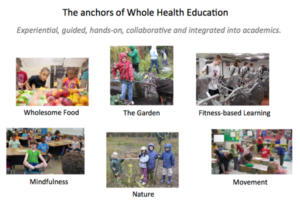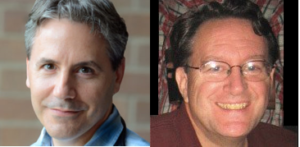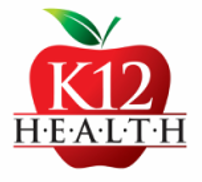Reach them young: Whole health education effort blends K-12 wellness activities and integrative health
January 30, 2018
 by John Weeks, Publisher/Editor of The Integrator Blog News and Reports Editor’s note: This analysis article is not edited and the authors are solely responsible for the content. The views and opinions expressed in this article are those of the authors and do not necessarily reflect the official policy or position of Integrative Practitioner. I asked integrative pediatrics veteran Larry Rosen, MD why he was linking with Taylor Walsh on an initiative to implant health skills in children. “Big picture? To change the world. As usual.” We laughed. The founding member and past chair of the American Academy of Pediatrics Section on Integrative Medicine then alluded to a recent article that spoke of the perverse incentives that hold back integrative strategies in the medical industry. The integrative pediatrics pioneer knew those challenges first hand. He then laid out the vision driving an invitational meeting that he and Walsh will convene at Georgetown University in June 2018: “I want kids to leave high school with a strong sense of autonomy and control over their own health. This is how we are going to change the health care system.” WholeHealthED – the soon to-0be website for the “Project for Whole Health Education in K-12 - was developed over the last four years by Walsh, a writer-activist and founder of Integrative Health Strategies. He conceived and directed the Cover My Care project for the Integrative Health Policy Consortium (IHPC). Like Rosen, he’d come to see the potential for establishing and sustaining a curriculum in health that would create the foundations for a thorough competency in health that would guide student choices in life as they grow and mature.
by John Weeks, Publisher/Editor of The Integrator Blog News and Reports Editor’s note: This analysis article is not edited and the authors are solely responsible for the content. The views and opinions expressed in this article are those of the authors and do not necessarily reflect the official policy or position of Integrative Practitioner. I asked integrative pediatrics veteran Larry Rosen, MD why he was linking with Taylor Walsh on an initiative to implant health skills in children. “Big picture? To change the world. As usual.” We laughed. The founding member and past chair of the American Academy of Pediatrics Section on Integrative Medicine then alluded to a recent article that spoke of the perverse incentives that hold back integrative strategies in the medical industry. The integrative pediatrics pioneer knew those challenges first hand. He then laid out the vision driving an invitational meeting that he and Walsh will convene at Georgetown University in June 2018: “I want kids to leave high school with a strong sense of autonomy and control over their own health. This is how we are going to change the health care system.” WholeHealthED – the soon to-0be website for the “Project for Whole Health Education in K-12 - was developed over the last four years by Walsh, a writer-activist and founder of Integrative Health Strategies. He conceived and directed the Cover My Care project for the Integrative Health Policy Consortium (IHPC). Like Rosen, he’d come to see the potential for establishing and sustaining a curriculum in health that would create the foundations for a thorough competency in health that would guide student choices in life as they grow and mature.  “Our working idea is that kids should be educated to understand what goes into their health and that of their families and communities. And that we now have the knowledge and experience, informed in part by the integrative approach to human health, to create such a learning experience." Walsh partnered with Rosen and a handful of professionals experienced in developing whole health-related programs. One advisor is Kim Furtado, ND, director of the SNAC school garden program at the Southern Delaware School of the Arts. Another is Bonnie Gallion, a 6th grade ESL teacher in Washington DC public schools whose wellness work has gained national recognition. Rosen's previous experience with Lorraine Marino at the Cambridge, Massachusetts Marino Health Foundation – the backers of the Marino Center for Integrative Health -- ultimately led to the Foundation funding the forthcoming meeting in Washington. There 25-30 leaders will begin considering the common goals and potential for those wellness "anchors" and engagement with integrative health. “People have been doing this kind of work in schools in silos for a long time,” explains Rosen, “installing gardens, mindfulness curricula, nature education, nutrition literacy and fitness programs. We are hoping to act as a clearing house, holding space to facilitate aggregating their experiences, so we can share and learn from each other while exploring common ground and goals.” Walsh anticipates that part of the June meeting will be devoted to short, concise sharing of experience and the status of integration into K-12 between the various whole health modalities and practices. “We want educators to see that they are part of something larger than themselves, that they are already in fact practicing whole health education,” he says, adding: “We see synergies. Hopefully they will buy into the larger idea of ongoing collaboration.”
“Our working idea is that kids should be educated to understand what goes into their health and that of their families and communities. And that we now have the knowledge and experience, informed in part by the integrative approach to human health, to create such a learning experience." Walsh partnered with Rosen and a handful of professionals experienced in developing whole health-related programs. One advisor is Kim Furtado, ND, director of the SNAC school garden program at the Southern Delaware School of the Arts. Another is Bonnie Gallion, a 6th grade ESL teacher in Washington DC public schools whose wellness work has gained national recognition. Rosen's previous experience with Lorraine Marino at the Cambridge, Massachusetts Marino Health Foundation – the backers of the Marino Center for Integrative Health -- ultimately led to the Foundation funding the forthcoming meeting in Washington. There 25-30 leaders will begin considering the common goals and potential for those wellness "anchors" and engagement with integrative health. “People have been doing this kind of work in schools in silos for a long time,” explains Rosen, “installing gardens, mindfulness curricula, nature education, nutrition literacy and fitness programs. We are hoping to act as a clearing house, holding space to facilitate aggregating their experiences, so we can share and learn from each other while exploring common ground and goals.” Walsh anticipates that part of the June meeting will be devoted to short, concise sharing of experience and the status of integration into K-12 between the various whole health modalities and practices. “We want educators to see that they are part of something larger than themselves, that they are already in fact practicing whole health education,” he says, adding: “We see synergies. Hopefully they will buy into the larger idea of ongoing collaboration.”  Walsh anticipates that one work product of the project will be a curriculum in Whole Health Wellness Studies that can be adapted and implemented, in whole or in part, in multiple schools across the nation. Rosen imagines that by 2025 perhaps 5-10 schools will have adopted and road-tested the curriculum, with data being collected and shared. Benefits might be measured on education-related markers and on health-related scales. But what about the issue of already crammed K-12 curricula? Won’t this initiative run into the same problem in grade schools that complementary medicine advocates encountered 15-20 years ago when they urged medical schools to adopt model curricula related to integrative practices and practitioners? Rosen acknowledges that K-12 health educators may not immediately respond affirmatively to new programming. The June meeting agenda will include sharing on strategies for opening doors and gaining inclusion, understanding current challenges as well as opportunities. The team anticipates the group will perhaps create mechanisms for ongoing experience exchanges. Adds Walsh: "This is by no means a quick fix. Embracing whole health wellness studies has the kind of disruptive quality that many will recognize from the late 1990s when holistic and complementary health care started getting serious attention from physicians." “If we are going to say we want health care,” says Rosen, “and I mean health care with prevention prioritized over treatment, we must realize that the incentives in the present industry are focused on reactivity and disease - and they financially benefit hospitals, pharmaceuticals and insurers, not individuals. We need to introduce this whole health paradigm to children at an early age, so they will have fully integrated it by the time they are adults. Those that want this are not the institutions. It’s us, as individuals. Schools can be the vehicle.”
Walsh anticipates that one work product of the project will be a curriculum in Whole Health Wellness Studies that can be adapted and implemented, in whole or in part, in multiple schools across the nation. Rosen imagines that by 2025 perhaps 5-10 schools will have adopted and road-tested the curriculum, with data being collected and shared. Benefits might be measured on education-related markers and on health-related scales. But what about the issue of already crammed K-12 curricula? Won’t this initiative run into the same problem in grade schools that complementary medicine advocates encountered 15-20 years ago when they urged medical schools to adopt model curricula related to integrative practices and practitioners? Rosen acknowledges that K-12 health educators may not immediately respond affirmatively to new programming. The June meeting agenda will include sharing on strategies for opening doors and gaining inclusion, understanding current challenges as well as opportunities. The team anticipates the group will perhaps create mechanisms for ongoing experience exchanges. Adds Walsh: "This is by no means a quick fix. Embracing whole health wellness studies has the kind of disruptive quality that many will recognize from the late 1990s when holistic and complementary health care started getting serious attention from physicians." “If we are going to say we want health care,” says Rosen, “and I mean health care with prevention prioritized over treatment, we must realize that the incentives in the present industry are focused on reactivity and disease - and they financially benefit hospitals, pharmaceuticals and insurers, not individuals. We need to introduce this whole health paradigm to children at an early age, so they will have fully integrated it by the time they are adults. Those that want this are not the institutions. It’s us, as individuals. Schools can be the vehicle.”



















SHARE